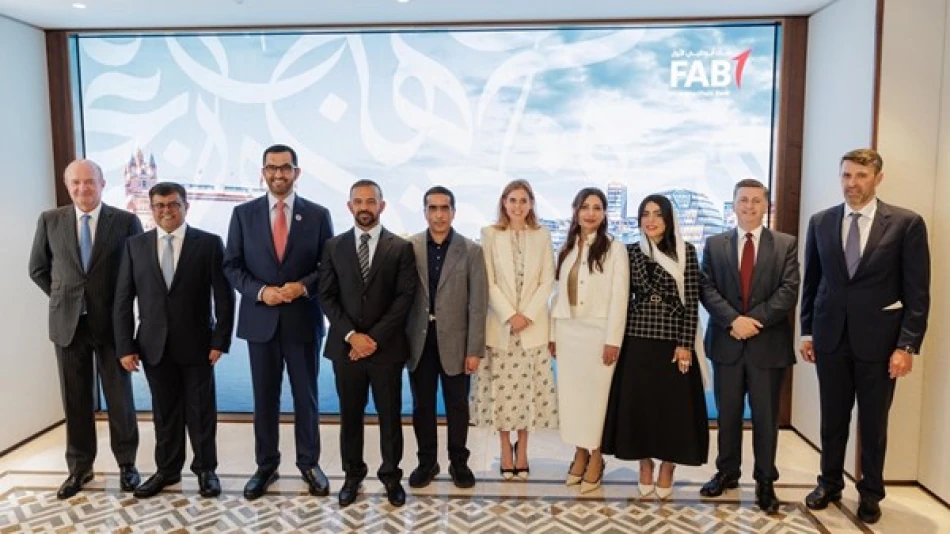
Abu Dhabi First Bank Unveils New Headquarters in the United Kingdom
First Abu Dhabi Bank Doubles Down on London as Gulf Capital Flows Reshape Global Finance
First Abu Dhabi Bank (FAB), the UAE's largest lender, has officially opened its new headquarters in London's prestigious Mayfair district, marking a strategic milestone in the bank's nearly five-decade presence in the UK. The move to 20 Berkeley Square signals FAB's growing confidence in London as a gateway for Middle Eastern capital flows and reflects the deepening financial ties between the UAE and Britain, now worth £24.3 billion in bilateral trade.
Strategic Positioning in a Post-Brexit Financial Landscape
The timing of FAB's expansion is particularly significant as London continues to navigate its post-Brexit identity as a global financial hub. While some international banks have scaled back their London operations, FAB's investment demonstrates the enduring appeal of the City for Gulf financial institutions seeking European market access.
CEO Hana Al Rostamani emphasized the bank's long-term commitment, noting that FAB was the first Gulf bank to establish a UK presence in 1977. "The opening of our new London offices represents another step in the bank's growing journey," Al Rostamani said, highlighting the bank's role in connecting global insights with regional expertise.
The Mayfair Advantage
The choice of Berkeley Square in Mayfair is strategically calculated. This area houses numerous diplomatic missions, private wealth managers, and luxury brands—exactly the ecosystem FAB needs to serve its target clientele of high-net-worth individuals and corporate clients. The new facility focuses on private banking, corporate advisory services, and financial solutions that leverage FAB's strong presence across the Middle East and North Africa.
Numbers That Matter for Investors
FAB's international operations now represent 17% of the group's total income, a significant indicator of successful diversification beyond its UAE home market. With total assets of $366 billion as of June 2025, FAB ranks among the world's largest banking groups and maintains strong credit ratings of Aa3/AA-/AA- from major agencies.
The bank's 2023 achievement of listing $1.1 billion worth of sukuk and bonds on the London Stock Exchange demonstrates its growing role as a bridge between Islamic finance and Western capital markets—a niche that could prove increasingly valuable as ESG investing gains momentum.
Regional Context and Competition
FAB's London expansion mirrors similar moves by other Gulf financial institutions. Qatar National Bank and Saudi Arabia's banks have also been strengthening their international presence, particularly in London and New York. However, FAB's advantage lies in its established relationships and the UAE's position as a regional financial hub that competes directly with Singapore and Hong Kong for Asian capital flows.
The UK-UAE Financial Corridor
The relationship between Britain and the UAE extends far beyond traditional banking. More than 5,000 British companies operate in the UAE, while collaboration in clean energy, fintech, and innovation continues to expand. This creates multiple revenue streams for FAB beyond traditional lending and wealth management.
The bank's focus on cross-border capital flows and financial innovation positions it to benefit from several macro trends: the diversification of Gulf economies away from oil, the growth of family offices in the region, and increasing trade between Asia and Europe via Middle Eastern hubs.
Cultural Diplomacy as Business Strategy
Alongside the headquarters opening, FAB launched a cultural initiative featuring artistic films and interactive narratives exploring shared values between the UK and UAE. While this might seem peripheral to banking, it reflects a sophisticated understanding that relationship-building in private banking often transcends pure financial metrics.
Market Implications and Future Outlook
For investors and market watchers, FAB's London expansion signals several important trends. First, Gulf banks are increasingly confident about their ability to compete globally, not just regionally. Second, London remains attractive to international financial institutions despite Brexit-related uncertainties.
The bank's AA sustainability rating from MSCI and its ranking among the top 6% of global banks for ESG criteria positions it well for the growing emphasis on sustainable finance. As European regulations around ESG disclosure tighten, FAB's early positioning could provide competitive advantages.
FAB's London bet represents more than geographical expansion—it's a statement about the future of global finance, where regional expertise and international reach combine to serve increasingly sophisticated cross-border capital flows. With the UAE's continued economic diversification and London's enduring role as a financial gateway to Europe, this partnership appears well-timed to capture emerging opportunities in an evolving global financial landscape.
Most Viewed News

 Layla Al Mansoori
Layla Al Mansoori






